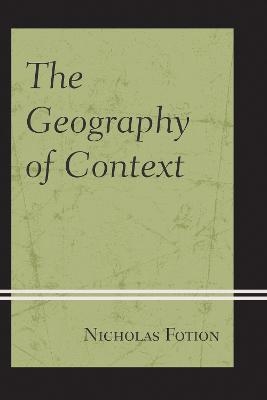
The Geography of Context
Seiten
2019
Hamilton Books (Verlag)
978-0-7618-7103-3 (ISBN)
Hamilton Books (Verlag)
978-0-7618-7103-3 (ISBN)
We cannot use language without having context in place. But context is not a single thing. Instead, typically, each use of language presupposes a complex set of beliefs, habits, behaviors, and moral commitments.
When we use language, we presuppose many different things. Context is another name for these presuppositions. But it also can be the name of all these different presuppositions ordered in a certain way. This study of context focuses on the differences since many studies of context focus excessively on usage found in the sciences and in everyday observations. Other uses such as promising, giving directions, evaluating (i.e., ranking) all sorts of things around us, expressing our feelings, and issuing declarations (e.g., “You are promoted”) are equally important. The analogy of ‘geography,’ as used in this study, suggests that one important way to study context is to attend to all, not just one, of the “continents” found in the “planet” that we call context. Once we learn our geography lesson, we come to a better understanding of how context can change, how it can be ordered, and how it can be examined. We also learn how layered, and thus how complicated it is.
When we use language, we presuppose many different things. Context is another name for these presuppositions. But it also can be the name of all these different presuppositions ordered in a certain way. This study of context focuses on the differences since many studies of context focus excessively on usage found in the sciences and in everyday observations. Other uses such as promising, giving directions, evaluating (i.e., ranking) all sorts of things around us, expressing our feelings, and issuing declarations (e.g., “You are promoted”) are equally important. The analogy of ‘geography,’ as used in this study, suggests that one important way to study context is to attend to all, not just one, of the “continents” found in the “planet” that we call context. Once we learn our geography lesson, we come to a better understanding of how context can change, how it can be ordered, and how it can be examined. We also learn how layered, and thus how complicated it is.
Nicholas Fotion, emeritus professor of philosophy, Emory University, has authored twelve books and over one hundred articles. Theory and Anti-Theory in Ethics is his most recent book.
Introduction
Chapter 1 Text and Context
Chapter 2 More Surface Material
Chapter 3 Social Contexts
Chapter 4 Ethical (Moral) Memories
Chapter 5 Empirical Contexts
Chapter 6 More Empirical and Normative Contexts
Chapter 7 “Logic” and Contexts
Chapter 8 Still More “Logic”
Chapter 9 Expressives and Declarations
Chapter 10 Putting it Together
Chapter 11 Four Processes
Chapter 12 Interpretation
Chapter 13 Closing Thoughts
Bibliography
Index
About the Author
| Erscheinungsdatum | 09.05.2019 |
|---|---|
| Verlagsort | Lanham, MD |
| Sprache | englisch |
| Maße | 152 x 222 mm |
| Gewicht | 195 g |
| Themenwelt | Geisteswissenschaften ► Philosophie ► Sprachphilosophie |
| ISBN-10 | 0-7618-7103-9 / 0761871039 |
| ISBN-13 | 978-0-7618-7103-3 / 9780761871033 |
| Zustand | Neuware |
| Haben Sie eine Frage zum Produkt? |
Mehr entdecken
aus dem Bereich
aus dem Bereich
Aspekte einer Ontologie des Logos
Buch | Hardcover (2024)
Springer Fachmedien (Verlag)
CHF 167,95
Wie die Menschheit zu ihrer größten Erfindung kam
Buch | Softcover (2022)
C.H.Beck (Verlag)
CHF 25,20
Macht und Legitimität politischer Sprache im Prozess der europäischen …
Buch | Softcover (2023)
Nomos (Verlag)
CHF 103,60


